This year, Bangladesh and the Bengali diaspora in the UK are celebrating the Golden Jubilee of Bangladesh's independence. The celebration starts on 26 March 2021 and ends on 26 March 2022.
1947 Partition of British India
In 1947, partition gave way to two new states. These were India, with a Hindu majority population and Pakistan, with a Muslim majority population. Pakistan is comprised of two distinct areas, separated both culturally, and geographically. India filled the thousand miles of land between these two regions. Political power was concentrated in West Pakistan, which led to grievances in East Pakistan (now Bangladesh).
1947 – 1971 Pakistan period - Bengali language movement
In 1948, Mohammad Ali Jinnah, Pakistan's Governor-General, declared that "Urdu, and only Urdu" would be Pakistan's state language. This decision was unacceptable to Bengalis and led to birth of the language movement. Urdu was hardly spoken by anybody in the East. The decision led to protests. On 20 February 1952, the Pakistani Government issued Section 144, restricting gatherings and rallies.
21 February 1952 – Martyrs’ Day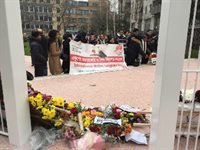
On 21 February, Bengali students gathered, defying Section 144. The police opened fire, killing four students, one other person and injuring many. The language movement led to the realisation that the Bengalis constituted a separate nation. Their destiny lay not with Pakistan but elsewhere as an independent country.
Abdul Gaffer Choudhury
Abdul Gaffar Choudhury, journalist and Freeman of Tower Hamlets, wrote the well-known Martyr’s Day song Amar bhaier rokte rangano Ekushe February.
Shahid Minar in Altab Ali Park
The Shahid Minar in Altab Ali Park was erected in 1999 through a partnership between the local Bengali community and Tower Hamlets Council. It was funded by contributions from 54 local Bangladeshi community organisations. The calls from community leaders prompted the council to allocate space within the park to accommodate the memorial monument.
In the same year, UNESCO recognised the Bengali language movement, declaring 21 February as International Mother Language Day. This is now a day observed globally in recognition of the martyrs and to preserve linguistic diversity.
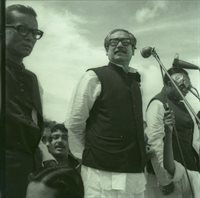 Bangabandhu Sheikh Mujibur Rahman – independence leader (1920–1975)
Bangabandhu Sheikh Mujibur Rahman – independence leader (1920–1975)
Bangabandhu Sheikh Mujibur Rahman challenged the disparity between the regions. He demanded self-autonomy for East Pakistan.
In 1969, at a million strong public rally in Dhaka, Sheikh Mujibur Rahman was given the affectionate title of Bangabandhu. This means friend of Bengal.
In the 1970s general election his political party, Awami League, won a landslide victory. The ruling elite in West Pakistan refused to allow Sheikh Mujibur Rahman to form a government. In protest Bangabandhu initiated the non-cooperation movement against Pakistani rule in 1971.
7 March 1971 speech
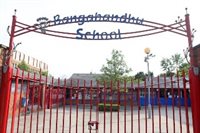 On 7 March 1971, as the military and the West's political leadership was conspiring not to hand over power to Bangabandhu Sheikh Mujibur Rahman, he delivered a fiery speech at the Racecourse Ground against the ruling elite. He urged ‘his people’ to turn every house into a fort of resistance. He closed his speech by saying,
On 7 March 1971, as the military and the West's political leadership was conspiring not to hand over power to Bangabandhu Sheikh Mujibur Rahman, he delivered a fiery speech at the Racecourse Ground against the ruling elite. He urged ‘his people’ to turn every house into a fort of resistance. He closed his speech by saying,
"Our struggle is for our freedom; our struggle is for our independence. Joi Bangla!"
This powerful speech inspired the Bengali nation to fight for its independence. In 2016 the speech was recognised by UNESCO and archived in its Memory of the World Programme.
In Tower Hamlets, a school in Bethnal Green, Bangabandhu Primary, is named in his honour. The ‘7 March Foundation’ was set up in 2018 to propagate Bangabandhu’s ideals.
This year Bangladesh is also observing Bangabandhu Sheikh Mujibur Rahman's 100 birth anniversary.
25 March 1971 - Genocide Day
On the night of 25 March, the Pakistani military began a violent crackdown to suppress the Bengali opposition. Bangabandhu Sheikh Mujibur Rahman was arrested and taken to West Pakistan. British journalist Simon Dring, in hiding, reported a massacre unfolding.
26 March 1971 - Declaration of independence
Before his arrest, Bangabandhu Sheikh Mujibur Rahman called upon his people to resist Pakistani forces of occupation in a declaration that read,
“This may be my last message, from today Bangladesh is independent. I call upon the people of Bangladesh wherever you might be and with whatever you have, to resist the army of occupation to the last. Your fight must go on until the last soldier of the Pakistan occupation army is expelled from the soil of Bangladesh and final victory is achieved.”
This declaration of independence marks the beginning of the Bangladesh Liberation War and is observed as Bangladesh Independence Day.
10 April 1971 - A government in exile
Following the Pakistani military crackdown, Awami League leaders crossed over to India for safety. On 10 April, the People's Republic of Bangladesh Government, was formed in exile with Bangabandhu Sheikh Mujibur Rahaman as the President and Tajuddin Ahmed as the Prime Minister.
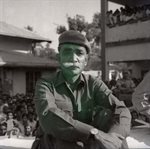 26 March 1971 – 16 December 1971, The Liberation War of Bangladesh
26 March 1971 – 16 December 1971, The Liberation War of Bangladesh
There were spontaneous uprisings throughout Bangladesh following the declaration of independence on 26 March 1971. On 12 April 1971, Colonel MAG Osmani was appointed Commander-in-chief of Bangladesh Forces known as the Mukti Bahini. In addition to Mukti Bahini, guerrilla groups led by individual leaders successfully controlled some areas within Bangladesh.
In a tribute to Colonel MAG Osmani, there are four organisations named after him:
- Osmani Primary School in Vallance Road
- A community venue, Osmani Centre in Underwood Road
- A dance music outfit Osmani Soundz
- Bongobir Osmany Trust, a community organisation.
16 December 1971 - Victory Day
On 21 November 1971, Bangladesh Muktu Bahini and the Indian forces formed an Allied Command and went on to defeat the West Pakistani army. The resulting surrender was the largest in the number of prisoners of war since World War II. Victory against Pakistan was declared on 16 December 1971.
Genocide in Bangladesh
During the war, there were widespread killings and other atrocities carried out by the Pakistan military. Bangladesh authorities state that three million people were killed. Bangladeshi sources cite a figure of over 200,000 women killed, tortured and/or raped, giving birth to thousands of war babies.
On 16 December 2002, George Washington University's National Security Archive published declassified communications between US embassy officials, the United States Information Service centers and officials in Washington DC. These documents show that US officials working in diplomatic institutions used the terms selective genocide and genocide to describe events at the time.
Refugees
There was an internal displacement of 30 million civilians within Bangladesh, with a further 10 million people fleeing the country to seek safety in neighbouring India.
14 December 1971– Martyred Intellectuals Day
On 14 December 1971, just two days before the surrender, the Pakistan Army and local Razakar militia (collaborators) abducted and murdered hundreds of Bengali intellectuals. 14 December is observed as Martyred Intellectuals Day.
8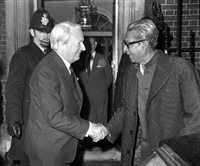 January 1972 - Bangabandhu Sheikh Mujibur Rahman’s release
January 1972 - Bangabandhu Sheikh Mujibur Rahman’s release
Following Bangabandhu Sheikh Mujibur Rahman’s release from Pakistan, he came to London on 8 January 1972. In London, he was warmly greeted by the British Prime Minister Edward Heath and Labour leader Harold Wilson.
4 February 1972 - The UK recognises Bangladesh
On 4 February 1972, the UK officially recognised Bangladesh. This led to recognition from other European and Commonwealth nations and Bangladesh's induction into the Commonwealth on 18 April 1972.
Researched and compiled by the Swadhinata Trust
The Swadhinata Trust is a Tower Hamlets based, non-partisan, secular Bengali heritage organisation. It was established to raise awareness about Bengali history, culture and heritage. It has created resources for the British Bengali and wider communities in the fields of education, research and the creative arts.